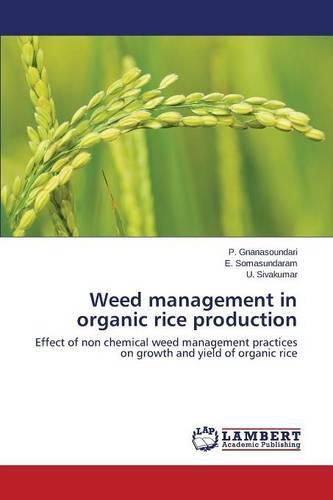Readings Newsletter
Become a Readings Member to make your shopping experience even easier.
Sign in or sign up for free!
You’re not far away from qualifying for FREE standard shipping within Australia
You’ve qualified for FREE standard shipping within Australia
The cart is loading…






This title is printed to order. This book may have been self-published. If so, we cannot guarantee the quality of the content. In the main most books will have gone through the editing process however some may not. We therefore suggest that you be aware of this before ordering this book. If in doubt check either the author or publisher’s details as we are unable to accept any returns unless they are faulty. Please contact us if you have any questions.
Rice is the staple food for millions of people in the Asia-pacific region; 90% of the world’s rice is grown and consumed in Asia. The indiscriminate use of chemicals in the rice environment thus polluting the fragile system has created an increasing awareness and interest among the rice farmers on organic farming. Weed infestation is regarded as one of the major causes of low crop yields throughout the world and can cause 50-60 % reduction in grain yield under puddle conditions and 91% yield reduction in non-puddled conditions. Organic weed control encourages weed suppression rather than elimination. This is done by promoting soil health through a combination of crop rotation, cover crops, biologically based bio-fertilizers, compost and mulch. Proper management through organic methods offer varied benefits over chemical herbicides, including increased biodiversity, improved soil nutrition and structure, and protection of ground and surface water. The present research work is aimed to confirm this possibility in weed control and evaluate the influence on yield performance in organic rice farming system employing non-chemical weed management practices.
$9.00 standard shipping within Australia
FREE standard shipping within Australia for orders over $100.00
Express & International shipping calculated at checkout
This title is printed to order. This book may have been self-published. If so, we cannot guarantee the quality of the content. In the main most books will have gone through the editing process however some may not. We therefore suggest that you be aware of this before ordering this book. If in doubt check either the author or publisher’s details as we are unable to accept any returns unless they are faulty. Please contact us if you have any questions.
Rice is the staple food for millions of people in the Asia-pacific region; 90% of the world’s rice is grown and consumed in Asia. The indiscriminate use of chemicals in the rice environment thus polluting the fragile system has created an increasing awareness and interest among the rice farmers on organic farming. Weed infestation is regarded as one of the major causes of low crop yields throughout the world and can cause 50-60 % reduction in grain yield under puddle conditions and 91% yield reduction in non-puddled conditions. Organic weed control encourages weed suppression rather than elimination. This is done by promoting soil health through a combination of crop rotation, cover crops, biologically based bio-fertilizers, compost and mulch. Proper management through organic methods offer varied benefits over chemical herbicides, including increased biodiversity, improved soil nutrition and structure, and protection of ground and surface water. The present research work is aimed to confirm this possibility in weed control and evaluate the influence on yield performance in organic rice farming system employing non-chemical weed management practices.